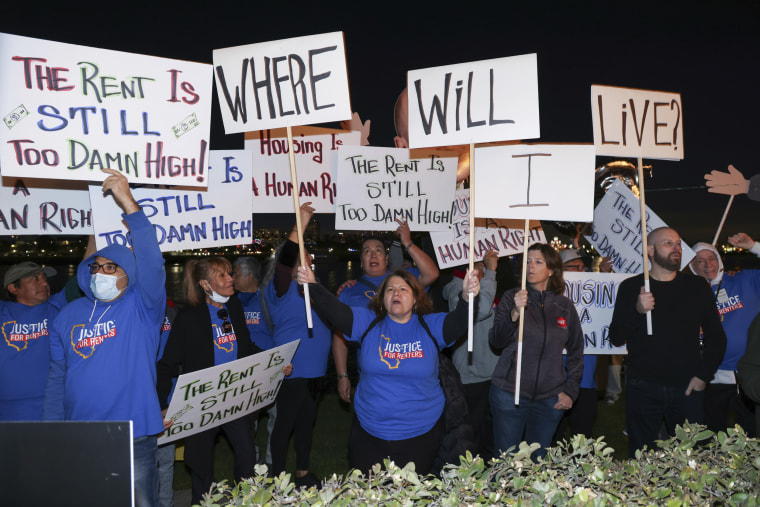Miriam de Santiago says she worries about the rent on her home every day, doing the math to make sure she can meet her obligations without compromising the health of her son, who has epilepsy.
“Epilepsy medication costs between $780 and $1,000 [a month], and we have to have it at home and at school. With the rent increases, I have to decide which medicine to request first, see which one is more urgent and find a balance,” De Santiago said in an interview.
Her family has lived with her two teenage children in the Boulder Meadows Mobile Home Park community in Boulder, Colorado, for 16 years. In 2020, a corporation bought the property where the community is located. Before then, she said, her rent would go up about $10 or $15 a year, but in 2020, she said, her rent went up by $70, with subsequent increases of up to $35 a year and this year up by $45.
“We have suffered from anxiety and depression. And we’ve seen cases of people not sleeping and even losing their hair because they’re thinking that at some point they’re going to get a knock on the door and be told they have to leave,” De Santiago, who is with 9 to 5 Colorado, a nonprofit group that focuses on economic justice, said about the situation in her community. Her landlord did not respond to a request for comment.
De Santiago and her family’s experiences following rent increases were in a report by Human Impact Partners, or HIP, a nonprofit organization focused on researching public health and social justice issues. The study denounced how practices of corporate landlords are affecting the health of tenants in some areas of the U.S. According to HIP, a Census Bureau Rental Housing Finance Survey found that about 45% of rental housing units are owned by “institutional investors,” a category that includes landlords using corporate structures like LLPs, LPs, LLCs, real estate investment trusts and real estate corporations.
“What we found is that corporate landlords are using strategies to create harmful housing conditions. And that creates problems such as homelessness, mental and physical health issues, and deepening racial and health inequities that disproportionately affect people of color, which includes Black and Latino communities,” Sukhdip Purewal, HIP’s director of research programs, said in an interview with Noticias Telemundo.
The study analyzes housing code violation data sets and interviews with public officials, housing researchers, community organizers and tenants in cities such as Los Angeles, St. Louis, New Orleans and Boulder.

HIP’s findings are consistent with other research. High housing prices and poor housing quality in the U.S. are directly related to health impacts, and many studies speak to impacts on issues such as the presence of mold, a neighborhood’s air quality or access to green space, said Juan Pablo Garnham, director of communications and policy at the Eviction Lab, an eviction and housing think tank at Princeton University.
“But a recent Eviction Lab study goes further, showing that tenants who pay high rents tend to have shorter life expectancies and die younger. That’s probably because when you’re forced to spend more on a commodity like housing, you’re forced to cut back on spending on things like doctor visits, medicine or healthy food,” he said.
Waiting for answers
According to the HIP report, corporate landlords harm public health through six strategies to increase profits: neglecting maintenance, carrying out mass evictions, raising rents and adding fees, evading taxes, avoiding accountability and influencing policy.
Some of those practices have affected people like Nora Franco, who lived for more than 15 years in a Los Angeles home that burned down last year. She said she still has not been able to return to her unrepaired home or negotiate with her corporate landlord.
“We’ve been waiting, but they won’t tell us anything. The manager told me to find a place to stay, that they would pay for the hotel. But they never gave me anything. Almost two months later they cleaned up because the debris from the roof of the house was left there. I had to throw away my living room and some of my personal belongings that were burned,” said Franco, an immigrant from Mexico who is undocumented and has been in the U.S. since 2006.
Franco shared several emails she sent to the building management company with Noticias Telemundo, detailing that the family had kept on trying to pay the rent as they sought answers about their situation. She was told in a phone call that the building management was no longer involved and that she would hear from the landlord’s attorneys, she said, but she never did.
“We, the tenants, are the injured parties, and the company benefits because the insurance company should have already responded to them, but they have not responded to us, and it has already been a year,” Franco said. Franco said she did not want to name her landlords because she hopes she can negotiate with them and fears repercussions.
Franco said she fears for her mental health because she is crammed into her brother-in-law’s apartment with her husband and two teenage children. “Nobody expects to go through a situation like we are going through, and the truth is very difficult,” she said.
According to the HIP study, nearly 2 out of 5 households in the U.S. rent, and the renter class is growing. In addition, Blacks, Latinos, the working class and young people are disproportionately represented in the renter sector.
“About 40% of renters identify as black or Latino, and 34% are under the age of 35. The median annual rent for renters is $41,000, almost half that of homeowners,” the researchers reported.
Purewal said: “The renter class, as we know, is more likely to be people of color and low-income. Additional research has shown that investor activity is higher in urban areas and in the Sunbelt. So this affects the entire southern U.S. between California and Florida, which is home to many immigrant and Latino communities.”
While the research does not include detailed figures on the impact of corporate practices on tenant health nationwide, it provides a comprehensive analysis of corporate landlords, housing conditions and health impacts.
Wall Street’s foray into the housing market
Several studies show that Wall Street firms engaged in operations to acquire single-family homes in foreclosure after the 2008 housing crisis. Since then, their influence has grown.
“Recent trends point to increased corporate ownership in the rental housing sector. They now own almost half of rental housing, and I think what’s unique about this moment is the increasing financialization of rental housing — in other words, treating our homes as something that Wall Street can bet on,” said Will Dominie, director of HIP’s Housing Justice Program.
Several lawmakers have proposed legislation to regulate or limit the activities of Wall Street firms in the real estate market.
In early November, Democratic Reps. Ro Khanna, Katie Porter and Mark Takano of California introduced the Stop Wall Street Landlords Act to limit the role of institutional investors in the single-family housing market and try to curb rental speculation.
“We have a housing crisis in the United States. I am the son of immigrants, and my parents came to this country so they could buy a house so their children could have one, too,” Khanna said in an interview after the bill, which is still making its way through Congress, was introduced. “Now, the largest group that wants to buy homes is the Latino community. In my district, one-third of all new homebuyers, nearly 480,000, are Latino. And yet they are being left out. And the reason is that these big Wall Street corporate hedge funds are buying up the single-family homes.”
Meanwhile, tenants like Miriam de Santiago are working to improve rental conditions in their areas and get mobile homes like hers rent-controlled in Colorado.
“They’re very long fights, but we’re fighting for it. And we’re already seeing in other places that take manufactured homes as affordable housing, and we want that protection,” de Santiago said. “A lot of times we think we don’t have rights because we live in a manufactured home, but they do exist. It is difficult to enforce them, but it is not impossible.”
A version of this story was first published in Noticias Telemundo.
For more from NBC Latino, sign up for our weekly newsletter.









Recent Comments